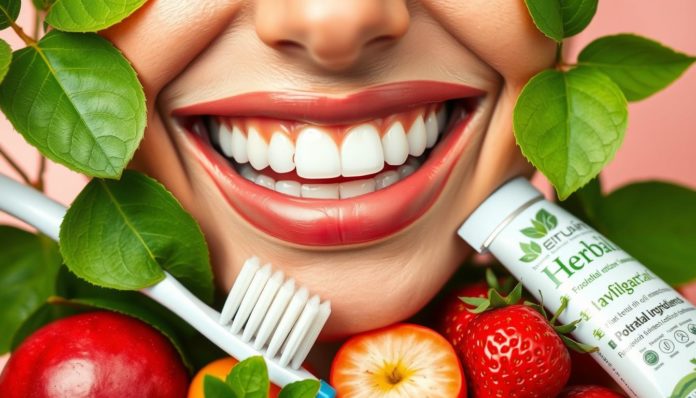Did you know the American Dental Association says 48% of adults aged 30 and above have gum disease? Taking care of your mouth is key to a healthy, bright smile. More than just looking good, a great smile is crucial for overall health. Good dental habits improve both your health and how you connect with others.
Keeping your mouth clean is the start of a healthy year. With the right care and dedication, your smile can show how much you value self-care.
Embrace the Basics: Brushing and Flossing
Keeping up a daily dental routine keeps your smile bright and healthy. It helps prevent problems before they start. You need to brush right, floss every day, and choose good tools for this.

Proper Brushing Technique
Brushing isn’t just rubbing a toothbrush around. It’s best to brush two times a day with fluoride toothpaste. Use a soft-bristled toothbrush at a 45-degree angle toward your gums. Then, gently move in circles to clean all parts of every tooth – the front, back, and tops.
This method fights plaque well and keeps your tooth enamel safe.
Importance of Daily Flossing
Flossing is as key as brushing. It gets rid of plaque and bits of food brushes can’t. Adding flossing to your routine cuts down on gum disease and cavities. Make sure to floss gently and avoid snapping it between your teeth. This is a big part of keeping your mouth healthy.
Choose the Right Tools
Picking the right tools for dental care is crucial. Go for a soft-bristled toothbrush and fluoride toothpaste. This combo cleans well without hurting your gums. Also, switch out your toothbrush every three to four months, or if it starts to wear out. The correct floss and mouthwash boost your dental care, making everything you do more effective.
| Tool | Recommendation |
|---|---|
| Toothbrush | Soft-bristled, replaced every 3-4 months |
| Toothpaste | Fluoride toothpaste for cavity prevention |
| Floss | Daily use, gentle motion |
| Mouthwash | Optional, for extra freshness and plaque control |
Choose Your Fuel Wisely: Diet and Oral Health
What you put in your mouth matters a lot for your oral health. Foods full of sugar and acid can damage your enamel. This leads to tooth decay and gum disease. On the flip side, eating healthy foods strengthens your enamel and gums.

Impact of Sugary and Acidic Foods
Eating lots of sugar and acid is bad for your teeth. Sugar makes harmful mouth bacteria create acid. This acid harms your enamel. Drinks like sodas, and foods like candy and citrus fruits, can cause enamel to wear away. This makes teeth weaker and harms your gums.
Beneficial Foods for Oral Health
Adding good foods to your meals helps your teeth and gums. Crunchy fruits and veggies, like apples and carrots, make more saliva. This cleans your teeth naturally. Dairy, like cheese and yogurt, gives you calcium to make enamel stronger. Leafy greens and nuts also give your teeth and gums important nutrients.
Role of Calcium and Phosphorus
Calcium and phosphorus are key for keeping enamel and gums strong. They are found in dairy, green veggies, and nuts. Vitamin C, in fruits like oranges and strawberries, helps keep gums healthy. It helps make collagen. These nutrients together keep your enamel strong and your gums tough. This all builds up to a healthy smile.
| Food | Nutrient | Benefit |
|---|---|---|
| Apples | Vitamin C | Promotes healthy gums |
| Carrots | Vitamin A | Boosts saliva flow |
| Cheese | Calcium | Strengthens enamel |
Stay Hydrated: The Importance of Water
Water is not just for quenching your thirst. It’s essential for your dental hygiene and oral health. Drinking water throughout the day helps clean your teeth. This reduces mouth acidity.
Saliva protection gets a boost from water. Being well-hydrated increases saliva production. Saliva washes away food bits and balances your mouth’s pH by acid neutralization.
“Hydrating sufficiently not only keeps your body running smoothly but also aids in robust oral hygiene practices, making your smile brighter and healthier.”
Drinking plenty of water daily keeps your teeth clean and prevents tooth decay. This habit is a key part of your dental hygiene routine. Think of it as an easy yet powerful tool for great oral health.
| Benefits of Staying Hydrated | Effects on Oral Health |
|---|---|
| Washes away food particles | Prevents buildup that leads to decay |
| Encourages saliva production | Saliva protection against cavities |
| Assists in acid neutralization | Reduces mouth acidity, protecting enamel |
Regular Check-ups: Navigating the Journey
Keeping your mouth healthy means going to the dentist regularly. It’s like how your car needs check-ups to work well. Your teeth and gums also need care from a professional to stay in good shape.
Frequency of Dental Visits
Dentists say you should visit them twice a year. These visits are key for stopping gum disease and spotting problems early. By seeing your dentist often, you can handle issues before they get worse. This approach saves you from pain and high treatment costs.
What to Expect During a Check-up
At a regular visit, dentists do deep examinations and professional cleanings. They get rid of plaque and tartar. You might also get X-rays, have your gums checked, and undergo oral cancer screenings. These cleanings will make your teeth shine and help prevent gum disease.
You’ll also get tips on making your oral hygiene better. This advice helps you keep a bright smile until your next visit. It’s great for building good dental habits that last a lifetime.
Mind Your Speed: Brush Gently
Brushing your teeth is key for good oral health. But, it’s crucial to not overdo it. Gentle brushing keeps your teeth clean and protects your enamel and gums. Some believe harder brushing means cleaner teeth, but this can cause damage.
Risks of Brushing Too Hard
Brushing too hard can harm your mouth. It risks wearing away your enamel, the protective outer part of your teeth. Once enamel is gone, it can’t come back. Also, too much pressure can make gums pull back. This exposes roots, raising the risk of sensitivity and decay.
Proper Brushing Technique
Using the right technique avoids these problems. Choose a toothbrush with soft bristles. They’re kinder on your gums and teeth. Use gentle, circular motions to brush. This cleans well without damaging your enamel or gums.
Also, make sure you brush for two minutes, covering all teeth surfaces. Gentle brushing helps care for the enamel and gums. Doing this regularly keeps your smile bright and your mouth healthy.
Healthy Mouth Tips: Daily Habits and Routines
For a bright smile, creating good daily habits for oral health is essential. Stick to a routine. This means brushing two minutes twice a day and flossing once. These steps are the foundation of good optimal dental hygiene.
Adding mouthwash to your routine boosts its benefits. An antimicrobial mouthwash fights bacteria in places your brush can’t reach. Pick a mouthwash that meets your needs and use it often to clean your mouth.
Diet is key in oral health, beyond brushing, flossing, and mouthwash. Cut down on sugary and acidic foods to protect your enamel. Choose healthier options like fresh fruits and veggies for better dental health.
Getting used to these habits makes them part of your life. Regular, quality oral care keeps your smile healthy and beautiful for years.
Don’t Ignore Warning Signs: Sensitivity and Pain
Feeling tooth sensitivity and dental pain may warn us that our dental health could be at risk. These signs are like the alert lights on a car’s dashboard. They tell us to check on potential problems without delay.
Things like hot, cold, sweet, or acidic eats and drinks can make your teeth sensitive. This may happen if tooth enamel wears down, tooth roots are bare, or your teeth have cracks. It’s important to deal with these signs quickly to avoid big future issues.
Dental pain can point to more serious issues like cavities, gum disease, or abscesses. Ignoring these signs can make things worse, maybe even leading to expensive treatments. Being alert and acting on oral discomfort is crucial for preventive dentistry.
Knowing how vital it is to catch these problems early can save us from big dental treatments. It also helps keep our teeth and gums healthy. If something feels off in your mouth, don’t wait. Make an appointment with your dentist.
Armor Up: Mouthguards for Protection
Mouthguards are key for preventing mouth injuries, especially for those who are active or play contact sports. If you box, play football, or enjoy other physical activities, using the right mouth protection is crucial. It helps avoid dental damage.
Mouthguards help shield your teeth from hard hits that could crack, chip, or knock them out. By using these guards, athletes cut down on injury risks. This keeps smiles healthy and prevents lasting damage. Let’s dive into the perks and features of various mouthguards:
| Type | Protection | Comfort | Customization |
|---|---|---|---|
| Boil and Bite | Good | Moderate | Limited |
| Custom-Fitted | Excellent | High | Full |
| Stock | Basic | Low | None |
Adding sports dentistry to your routine, like using mouthguards, boosts your game and protects your teeth. So, before you head out to play, remember to armor up. Protect your smile every time.
The Road Less Traveled: Quit Smoking
Deciding to quit smoking is a great choice for your oral health. Smoking greatly raises the risk of getting oral cancer, gum disease, and losing teeth. When you choose to stop smoking, you’re making an important move to prevent oral cancer and reduce gum disease.
Handling cravings and tough moments is key when you quit. Keeping busy, staying active, and finding support are good ways to stick with it. Also, rewarding yourself can really lift your spirits. For tips on dealing with cravings and managing stress, see this guide to quitting smoking.
Smoking causes many serious dental problems, like gum disease and oral cancer. Quitting smoking not only protects your mouth. It also leads to a brighter, healthier smile. Every step you take to quit smoking is a step towards a healthier, smoke-free life.
FAQ
What is the proper brushing technique?
Use gentle circles on all tooth surfaces including the front, back, and top. Brush twice daily with fluoride toothpaste. Also, replace your toothbrush every 3 to 4 months or if the bristles get worn out.
Why is daily flossing important?
Flossing removes plaque and food from between your teeth. This is where a toothbrush can’t reach. It helps stop gum disease and cavities.
What tools are recommended for optimal dental care?
Choose a soft-bristled toothbrush and the right floss. Adding antimicrobial mouthwash to your routine gets rid of bacteria in hard-to-reach spots.
How do sugary and acidic foods impact oral health?
Sugary and acidic foods can lead to tooth decay and gum problems. Eat less of them and go for healthier food choices to keep your teeth healthy.
Which foods are beneficial for oral health?
Eat lots of fruits, veggies, and dairy for strong teeth. Foods rich in Calcium and Vitamin C are good for your teeth and gums. Crunchy foods help make saliva, cleaning your teeth naturally.
Why are calcium and phosphorus important for enamel strength?
Calcium and phosphorus rebuild and make tooth enamel strong. These nutrients are key for keeping your smile healthy.
How does staying hydrated help with oral hygiene?
Water cleans leftover food and cuts down mouth acidity. It also boosts saliva production, fighting off cavities naturally.
How often should I visit the dentist for check-ups?
Go to the dentist twice a year for cleanings and check-ups. This helps prevent dental problems and catch any early.
What should I expect during a dental check-up?
Dental check-ups usually have examinations, cleanings, and advice on oral care. They are customized to meet your needs.
What are the risks of brushing too hard?
Brushing too hard can hurt your gums and enamel. Be gentle to keep your teeth safe and clean.
What is the proper technique for brushing gently?
Brush softly and make sure to clean every part of your teeth. This keeps your enamel safe and your gums healthy.
What daily habits support optimal dental hygiene?
Brush for two minutes twice a day, floss every day, and use mouthwash. Limit sugary and acidic foods for better oral health.
What do sensitivity and pain in the mouth indicate?
Pain and sensitivity can signal serious dental problems like decay, cracked teeth, or gum disease. It’s important to address these signs quickly.
How do mouthguards protect during sports?
Mouthguards prevent dental injuries such as chips, breaks, and tooth loss during sports. They save you from long-term dental issues.
How does quitting smoking benefit oral health?
Stopping smoking lowers the risk of gum disease, tooth loss, and oral cancer. It helps keep your mouth healthy and your smile bright.


